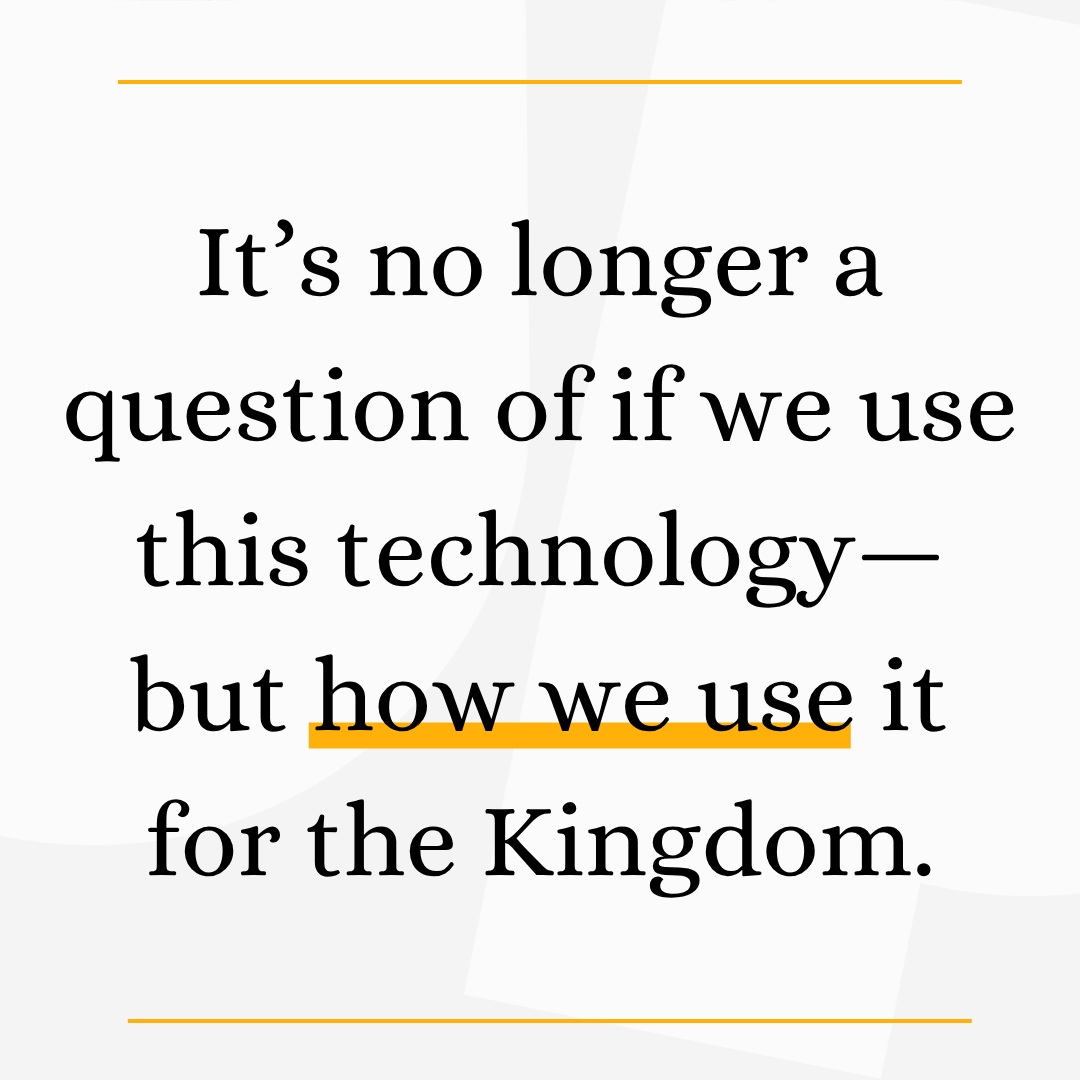How AI Can Support Faith Formation in Children's Ministry
Scripture Union Canada’s Lawson Murray shares 7 practical ways AI can support personalized, creative, and accessible learning in your ministry—while keeping Jesus at the center.

How can AI enhance faith formation?
God’s Word most effectively reaches us through approaches and encounters that communicate deeply and connect emotionally. Yet even though children are digital natives, most churches still use lecture-based methodologies that were arguably outdated years ago. This is unacceptable. In an age where every child lives with technology at their fingertips, how we nurture their faith formation cannot remain stuck in the past.
Author and journalist Tony Reinke asks, “Do we have eternal hope through the grave or by avoiding the grave?” That’s a leading question when it comes to technology. With the daily use of televisions, tablets, smartphones, and computers commonplace in the home and school, the issue isn’t whether churches should use AI for children’s faith formation; it’s determining how to use it well. As Pastor David Thorne in AI for Churches says, “The reality is that AI is increasingly becoming integrated into every online platform we use. It’s no longer a question of if we use this technology but how we use it.”
Tech-Wise Children’s Ministry
So, how can we use technology well to cultivate children’s faith formation? Or, to phrase the question differently: How do we get AI in the passenger seat as we provide directions for children’s faith formation? Here are seven ways you can use technology well:

1. Curating what’s helpful or harmful.
Numerous AI-powered tools are designed to enhance children’s safety. These include content filters, monitoring applications, and parental control software. Training children to make decisions based on God’s Word is part of the faith formation process. Employing technology to simulate scenarios that challenge children to make decisions guided by spiritual discernment will equip them for spiritual growth.
2. Fostering sanctified imagination.
Children’s ministry should encourage sacred reflection through the asking of profound questions. Use technology to fire up children’s capacity to think critically and resourcefully in ways that positively impact culture in prophetic or transformative ways. AI’s potential lies in fostering inspiration, imagination, and innovation. So, harness technology like generative chatbots as collaborators and enhancers of children’s God-given creative potential.
3. Transmitting truth.
Children’s faith formation requires robust Bible engagement. Most teaching in existing children’s ministry programs or activities relies on content creators and curricula, which limits exploration and discovery. Correctly used, technology can multiply content connections in ways that enable children to connect more intuitively with God’s Word. By embracing technology, pastors and teachers gain access to a wide range of tools, including interactive games, videos, and songs.

4. Accommodating different learning styles.
Children learn differently, so it’s high time we moved away from a cookie-cutter approach to faith formation and tailored our practices to fit their uniqueness. If, for instance, an auditory interpersonal learner is only exposed to God’s Word through a methodology suited to reading and writing learners, it will hinder their faith formation. This is where technology like Squirrel AI is beneficial. It facilitates multiple learning styles and abilities by personalizing content to fit how children take in, process, and store information.
5. Enhancing accessibility.
Communication technology like Zoom bridges the gap between in-person instruction and online learning, ultimately allowing children to continue praying, studying the word of God, and deepening their connection with Christ wherever possible. AI also enhances accessibility for children with exceptionalities or helps children with language barriers find a voice with tools like Formative AI and Google Translate.
6. Increasing spiritual motivation.
Technology and social media use can increase a child’s motivation to study God’s Word and develop a robust faith in new and transformative ways. While we should never overlook the necessity for face-to-face interactions, let’s value how technology can provide age-appropriate links to Christian podcasts, entertainers, resources and ministry opportunities that incentivize faith formation.

7. Customizing a plan to follow Jesus.
Just as every child doesn’t learn the same way, not every child’s faith formation happens the same way. ChatGPT can help create a customized plan to follow Jesus, identifying and adapting faith formation practices to fit a child’s schedule, disposition, and preferences. For instance, it can suggest Scripture passages that resonate with a child’s life situation, offer prayer prompts that fit their personality, or recommend spiritual disciplines that align with their schedule.
Bridging the gap
How can AI enhance faith formation? You don’t have to figure this out all by yourself. Church management software systems such as Church.tech, MinistryPlatform, or Sunergo can help you harness and scale technology in your context to foster deeper relationships, improve communications, and create a more inclusive and caring children’s ministry. As Bambang Budijanto, General Secretary of the Asia Evangelical Alliance, said, “Without action, data is meaningless. All of this is only helpful if it leads to action for the Kingdom.”
A final caution: Don’t let fear win out over faith when considering the use of technology for children’s ministry. AI doesn’t threaten God. It’s theologically naïve to believe otherwise. In His providence, God has always ruled over the material world. Yes, the flourishing of children’s faith doesn’t hinge on our adoption of new technologies, but it does require us to communicate and connect in their heart language, which is digital.
© Scripture Union, 2025
This blog was originally published on Children's Ministry Basics.
Looking for more ways to navigate AI in children’s ministry?
Explore the full AI in Children’s Ministry Report
Download the free AI Policy Toolkit
Both resources are designed to equip leaders like you with practical guidance as you shape faith formation in a digital age.

Lawson is married to his best friend, Karen. They love spending time together with their children and grandchildren (11 so far!). Lawson is deeply committed to connecting children, youth, and families with Jesus and His Word. He is a writer/author, researcher, ministry innovator, conference speaker, adjunct seminary professor, international trainer, Bible engagement specialist, children’s, family and sports ministry specialist, and President of Scripture Union Canada.
Sign up for your Free Sampler account today!
Get instant access to everything you need, and more than you could ever imagine, for every ministry moment. Thousands of lessons, games, activities, crafts, and worship media assets are ready for you!
Create Free Sampler Account